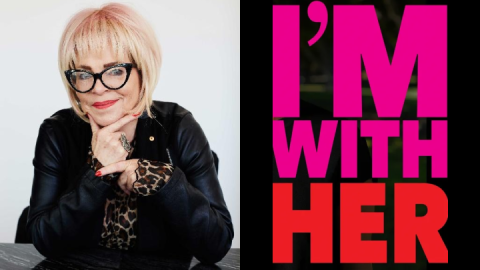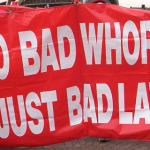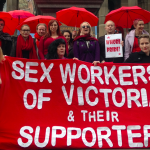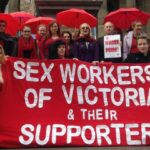Sex Work as Work Is a Feminist Issue, Says Rights Activist Julie Bates AO

Writer/director Victoria Midwinter Pitt’s I’m With Her continues play to sell-out audiences around the country. The piece explores the journeys of resistance taken by eight pioneering women in patriarchal Australia through a #MeToo lens.
Amongst the voices of the women that form the basis of the play are current federal minister for early childhood education Anne Aly, the nation’s first female prime minister Julia Gillard, anthropologist Professor Marcia Langton, along with sex worker rights’ advocate Julie Bates AO.
Bates was awarded her Order of Australia in 2018, in recognition of her decades-long advocacy, which has involved promoting harm reduction, upholding sex worker rights via recognising their work as legitimate and one that ought to be valued, whilst calling for the removal of laws that criminalise the profession.
The activist began forging change when, in the mid-1980s, she convinced the owner of the Kings Cross Nevada brothel to support the use of condoms in the establishment, and she then went on to become the first in-house manager of what is today the Sex Workers Outreach Project (SWOP).
Sex work is work
I’m With Her played at the Subiaco Arts Centre this month, and while Sydney-based Bates was in WA, she called out the state for continuing to refuse to consider decriminalising its sex industry, despite the strong recommendations of the 2017 Kirby Institute/Curtin University LASH report.
Decriminalisation of the sex work industry is now recognised as best practice, as the removal of the criminal penalties applying to such work opens the way for the industry to operate similar to all others, which includes industrial rights and workplace health and safety protocols.
Along with her peers and allies, Bates campaigned for decriminalisation of sex work which eventually saw a set of laws passed by parliament in 1995 which made NSW the first decriminalised jurisdiction on the planet.
And numerous inquiries have since found that this system has improved worker wellbeing and curbed police corruption.
Since this world leading model was rolled out in this state, the entire country of New Zealand followed suit early this century, while the Northern Territory decriminalised its industry in 2018, and Victoria is currently implementing its system of decriminalisation in a staged process.
“Getting real in urban planning”
Back when NSW pioneered sex work decriminalisation, Bates was the inaugural sex industry liaison officer appointed to local government, while, these days, she continues to fight to improve the lives of workers, as well as participating in related academic research including the pivotal Law and Sex Worker Health (LASH) projects.
Over the last two decades, Bates has also run Urban Realists, which is a town planning and health and safety advisory body, in which, as principal of the business, she assists clients in establishing sex services premises, which can be a difficult process due to the regulatory system.
Sydney Criminal Lawyers spoke to Julie Bates AO about the forerunners of the sex worker rights movement that she tips her hat to, the reasons why this country is at the forefront of forward-thinking industry laws and the benefits to workers that decriminalisation has brought.

I’m With Her was recently performed at Subiaco Arts Centre. The play tells the story of eight prominent women, including Marcia Langton and Julia Gillard, in terms of their resistance to the obstacles patriarchy has placed in their paths.
Julie, your story as a sex worker rights activist was one of the eight featured in the piece. How would you say your journey has been one of resistance to the powers that be?
When you listen to the stories of the women of I’m With Her – who come from very diverse backgrounds – sitting in that audience on a number of occasions, as I did with the first production in Sydney, you will witness an amazing lightbulb moment when the audience gets it and understands there are more similarities in the politics of resistance than difference.
You will see we have all been busy navigating the myriad of challenges and obstacles while expanding our respective communities, building connections and discovering the collective courage and creativity it takes to make a difference and create change.
We are all worthy of a better deal in life.
It is no longer them and us, or the good girl versus the bad girl. It’s now one for all, and all for one, that we come together as a true sisterhood respecting and honouring the lived experience and rights we have each fought for, and some, have died for.
I am hopeful that these stories of resistance explored and witnessed in the productions of IWH galvanise the #MeToo movement to go back to the basics and be sure to include all women by giving a voice to the most marginalised and vulnerable, including sex workers, to support our fight for social justice in challenging patriarchal constraints on our lives and livelihoods.
Already we’re hearing from many individual teachers who’ve seen the show and are planning to teach it to their students. In the longer term, we would dearly love to see it on school curricula across the country.
But to answer your question more specifically, I stand on the shoulders of giants of the contemporary sex worker rights movement, when in 1975 several hundred French sex workers and their allies occupied the Church of Saint-Nizier in Lyon and a number of other churches in France.
The objective of these actions was to draw attention to the social and legal inequities sex workers faced, particularly police harassment and hostile responses to crimes committed against them, including the unsolved and little concern for murders of their colleagues, the removal of their children, the closure of their workplaces and to demand that sex work be recognised as a job like any other.
The TriCity Herald newspaper quoted one of the sex worker demonstrators involved in the Saint-Nizier Church sit-in on 8 June 1975 as follows:
“Above all we want to be officially recognised so that all kinds of insults end and we can lead a normal life when work is over.
And we don’t want our normal (male) companion to risk arrest for pimping, and that our children – because most of us are good mothers – should no longer be taken from us under any circumstances.
We are ready to pay reasonable income taxes and contribute for social security and, why not, to a pension fund.”
This act of resistance triggered an international movement and is widely considered to have given birth to the modern sex worker rights movement.
Each year on 2 June, sex workers and our allies in towns and cities around the world come together and stand in solidarity to demand our human, legal and industrial rights be respected and call for the decriminalisation of our industry.
So, I have simply carried on this tradition in fighting back against injustice, and along the way with peers and allies, have kicked some goals.
In terms of my resistance with the powers that be, you could say I’ve been up against it for most of my life. Starting with a pretty traumatised childhood, living with a war-damaged and often violent father.
Then, as a young woman, single and pregnant, experiencing firsthand the Dickensian treatment dished out to single mothers or ‘unwed’ mothers as we were called at the time – you had no voice, no rights and no support to keep and raise your child.
The expectation was that you would walk out of that hospital after a few days of ‘recovery’ leaving your child behind.
Then as a young law clerk working for a Melbourne law firm on a government inquiry into corrupt police, representing sex workers, brothel owners and other complainants, I finally joined the dots in understanding the imbalance of power relations and the dynamics of discrimination and marginalisation and the impacts of draconian and moralistic laws and social control.
The political became personal once I joined the ranks of the oldest profession.
Whilst you were in Perth for the reading, you took the opportunity to highlight the need for the decriminalisation of sex work in WA. The 2017 LASH (Law and Sex Worker Health) report focused on the sex industry in that state.
Why is WA falling behind other Australian jurisdictions on this matter? And what does that mean for local sex workers?
A very good question and one that I have put to Mr McGowan via the press we received during the week I was in Perth.
Being in Perth and promoting IWH was a perfect opportunity and one wholeheartedly supported by the IWH team but sadly not enough time to seek a meeting with him.
But it is time someone from the media asked him that question, especially, as in part of his acceptance speech, he noted in the first words he spoke, that he would be a premier for all Western Australians.
My question, on the basis of that speech, in representing the interests of all Western Australians is, why would you, as a leader of civil society, want to maintain an underclass of people, more specifically women, who make up the majority of the sex industry, whose lives are regularly put in jeopardy due to the prevailing criminal laws in Western Australia?
This makes Western Australia a backwater equivalent of countries that restrict the lives of women and give control to male guardians via ridiculous, harmful laws and societal controls.
Our LASH study found that the WA laws had a negative impact on the health, safety and wellbeing of sex workers in a number of ways.
It fuelled stigma and discrimination in a range of settings and services and policing. Criminalisation is used as an excuse for abuse by clients. There is a reluctance of sex workers to go to the police as victims of crime, and the hidden nature and illegality of sex work impedes access to services and health promotion and to improving working conditions as their counterparts in decriminalised jurisdictions have achieved.
Coming clearly through the many interviews, and from my personal connections with sex workers in WA, time’s well and truly up for the WA government to get with the program.
It’s time now to join the ranks of their contemporaries in Victoria, New South Wales, the Northern Territory and across the ditch in New Zealand, to look to the evidence and the lived experience as we have provided in our LASH report, acknowledge the existence of the sex industry and reform the laws accordingly.
Queensland is currently moving towards sex work decriminalisation. Victoria has passed laws and commenced implementation of its decriminalised sex industry, while the NT passed such laws in 2018. And NSW has long had such a system.
Why has Australia become a world leader, along with NZ, in regard to implementing human rights focused sex work laws?
Australia is known for its largely bipartisan support and leadership in the globally respected human rights-based harm reduction movement, which arose in the early 1980s in response to the HIV pandemic. Similar initiatives were undertaken in New Zealand.
The internationally recognised benefits of decriminalisation of the sex industry in Australia – starting with New South Wales in 1995 and New Zealand in 2001 – has been well researched, documented, acknowledged and supported by international organisations, such as Amnesty International, the World Health Organisation, UNAIDS, Global Commission on HIV, Open Society Foundation, International Labour Organisation and other civil society groups and organisations.
This position has a long history. International Women’s Year in 1975, along with the sex worker sit-in at Saint-Nizier Church in Lyon and other parts of France in the same year, is probably a good starting point in finding our contemporary voice and the importance of gaining allies.
As the women’s movement gained momentum, so did the sex worker rights movement led by people, such as the late Margot St James, an American feminist, sex worker and early activist, dubbed the patron saint of sex workers around the world, along with many other feminists of the time in Australia and beyond, standing in solidarity with us and our demands, primarily, at the time, as a labour rights issue.
It’s a far cry from today’s anti-sex work faux feminists championing a patriarchal approach to our eradication through criminalising third parties, including our clients, aka the debunked ‘Swedish Model’.
Closer to home, due to the illegality and inherent dangers of speaking out, sex workers did not usually function as public spokespeople for their industry.
However, we were there amongst people who paved the way for our early responses that gave voice to our personal, political and social needs in respect to sex work, drug use, homosexuality and later to HIV.
Were it not for these early activists, we would have seen no shift in moral and political opposition and the tired old laws and attitudes that perpetuated draconian responses.
It was a time when we, as marginalised people, started to test our mettle in the ways of power relations and resistance. So, when HIV arrived, we didn’t just fall off the activist conveyor belt.
Luckily for us and the world, some of us were already sharpening our political claws. And our continued tenacious pursuit of decriminalisation with the support of allies and the uncovering of corruption amongst some of the highest-ranking police officers in the state, finally won out in 1995.
While decriminalisation had been recommended in other government inquiries focusing on broader areas of concern for sex workers and others, decriminalisation across the industry was finally realised following the findings of the Royal Commission into the NSW Police Service.
Known as the Wood Commission, it uncovered entrenched and systemic corruption in the NSW police service in connection with the sex industry and other areas of society.
The intent of these reforms was to minimise opportunities for corruption, support public health and work health and safety objectives, reduce stigmatisation of sex workers and, in a planning sense, treat all scales and types of sex industry premises equal to other land uses and businesses.
But AIDS was here and there was even more reason now to be literally fighting for our lives. As Dennis Altman notes in his book Unrequited Love – Diary of an Accidental Activist, “AIDS engendered new passions, alliances, skills that brought together the most remarkable group of people I’ve had the privilege of knowing.”
So, you could say HIV was the catalyst that helped strengthen the necessary alliances with politicians, healthcare professionals, bureaucrats, social researchers and even the media that gave us recognition, funding of our organizations and importantly, a place at the table in championing sensible public policy around sex work.
This partnership approach, as it is called in Australia, gave us a platform for pursuing our broader social justice agenda and to really test our mettle in the ways of power relations towards sustained social and legal change.
And that is pretty newsworthy, and it provided a beacon of hope for others to aspire to.
You were involved in the overhauling of this state’s laws back in the mid-1990s, which saw NSW become the first jurisdiction globally to decriminalise sex work.
In light of the new models that have been implemented in Victoria and the NT, is there a need for reforms to this state’s sex work laws in terms of how they’ve been operating over the last 27 years?
Despite some of the pitfalls in leadership and the discriminatory regulatory response in NSW, decriminalisation has enhanced the rights and opportunities of sex workers, improved their health and wellbeing and afforded labour rights and protections through the support of SafeWork NSW 2020.
However, not everyone has been able to benefit or is included. A bit like the #MeToo movement.
There have been many missed opportunities to get it right. One select committee inquiry, known as the Regulation of Brothels inquiry (ROB Inquiry), was established in 2016 to see if licensing the sex industry – as was then in existence in Victoria and has recently been overthrown for decriminalisation – might provide a better regulatory system.
In welcoming the report, the government noted that “decriminalisation of the sex work industry in NSW has achieved positive health outcomes and outreach” and the government, like the select committee, “continues to support decriminalisation as the best way of protecting sex workers and maintaining a more transparent sex work industry”.
A number of the committee’s recommendations have been implemented with others to follow. The first, with sex worker participation, was a review of the NSW Health and Safe Work Guidelines for Brothels in NSW.
The report concludes by noting that the government will not be introducing the licensing model described in the final report of the committee.
You can imagine, there was a collective sigh of relief when the report reached us and validated all we had been saying for years and that which we had said to the committee about maintaining decriminalisation, while fixing the broken bits.
While this report was helpful in maintaining decriminalisation and acting as a kind of review or evaluation of some of the benefits, the fact remains that the regulatory approach to sex industry land use by local government – councils with the support of the state planning department – is discriminatory, restrictive and does not cater to all scales and types of sex industry businesses.
In a 2011 report for the HIV/AIDS and Related Programs Unit South Eastern Sydney and Illawarra Health Regions, Berg et al noted that informants to their research identified a regressive current trend in regulation of sex industry land use at local government level, with one informant describing the situation as “re-criminalisation of the sex industry”.
Informants to this study, which included a number of highly experienced professionals, such as town planners, environmental health officers, legal professionals, social planners and sex industry experts, also expressed concerns that the approach of some councils “has had the effect of increasing risk of HIV/STI transmission in some sectors of the industry; along with creating new opportunities for corruption.”
The authors further noted that informants had:
“Expressed a variety of concerns about failures of implementation of decriminalisation in NSW that have substantially prevented the full realisation of its objectives.
In particular, the process of defining and guiding the new regulatory roles required of government authorities was not completed.
This resulted in many missed opportunities to enhance understanding of the intentions of the reforms and increase the awareness of the importance of maintaining good public health outcomes through community education and targeted training for local councillors and town planners.”
This lack of guidance and failure to consult led most councils to make ill-informed decisions, which included overly restrictive zoning for sex services premises (SSP) and some, outright prohibition of home occupation sex services HO(SS) in local environment plans (LEPs), overly restrictive location requirements in development control plans (DCPs), requiring development applications (DAs) from home-based sex workers in LEPs, and onerous restrictions led to low or zero levels of voluntary compliance.
For some councils, it led to an open manipulation of their planning controls. An example of the negative effects of the lack of guidance can be found in a 2009 submission to the Standing Committee on State Development by Sutherland Council in responding to the question:
“What difficulties are posed for councils when they have a significantly different regulatory tool to implement their overall plan and vision for an area?”
The response outlined that:
“At a policy level the council will attempt to introduce into its development control plan other provisions that will counter the LEP provision.
For example, the LEP may permit a form of development that the council opposes (eg brothels), so the council will make development control plan provisions that are so restrictive that no proposal could satisfy the requirements.
Should an applicant choose to submit an application, obstacles would be created to frustrate the applicant. Should the proposal then come before the council it would be refused so that the applicant was forced to appeal to the Land and Environment Court.”
There is still much to be done, including the provision of antidiscrimination protections and better informed regulators that consider the different types and scales of sex industry land uses that follow established better practice guiding principles of sex industry regulation, such as found in the Sex Services Premises Planning Guidelines.
But there is a bit of a light on the hill. The NSW Greens Party is advancing an antidiscrimination bill.
Another of the select committee’s recommendations, and that which we have been calling for, is a review of the aforementioned planning guidelines, along with training of local government staff and elected officials.
Developed 22 years ago to guide better practice in local government response to planning for sex industry land use, these guidelines were shelved and ongoing action by my colleagues, including our testimony at the ROB inquiry, has seen the Ministry of Health partnering with our local sex worker organisation and liaising with other government departments and agencies for a review of the guidelines and the development of an online training package.
This represents best practice guidance any jurisdiction should consider when taking on decriminalisation of their sex industry.
The very thing we are looking to achieve is to balance the rights and responsibilities of the sex industry, local government and local communities with the aim of enabling sex industry policies that result in ‘fair and equitable treatment’ for this land use and the people who work in this industry.
You’ve indicated that in jurisdictions where sex work has been decriminalised, the system has enabled beneficial initiatives that would have been impossible to implement if the work continued to be illegal and pushed to the margins.
What sort of constructive initiatives are we talking about?
I may have covered much of this already, but generally speaking decriminalisation enables a focus on sex work as work, along with workplace health and safety protocols.
It is an important step towards reducing stigma and discrimination, while giving agency to sex workers in order that we too can raise our voices in challenging patriarchal constraints, some of which is highlighted in the play.
With police removed as regulators, there is limited opportunity for corruption and abuse. Sex workers can then start to expect police to provide support to them as they would any other citizen.
Also, importantly, it sends a message to the public, and potential clients, that we have the rights of others in our community, and we will no longer be silent and fearful of reporting crimes against us.
Finally, our place in society is better respected or at least a pathway is opened, in order that we can be included as full members of society, no longer hiding in fear and shame.
And lastly, Julie, the inclusion of your story amongst the eight characters in I’m With Her has been described as “an unconventional feminist voice, too-rarely included in the #MeToo movement, that of the sex worker.”
Some people find associating sex worker rights with feminism a problematic coupling. Why do you consider the empowerment of sex workers a feminist issue?
Well, to be a sex worker is the ultimate feminist act. Anyone who considers themselves a feminist ought to consider sex work as a fundamental labour rights issue, coupled with a supportive human rights-based legislative response that only decriminalisation can achieve.
We negotiate with clients, the majority of whom are men, for mutual respect and desired outcomes, so long as the laws, as we’ve discussed, provide the necessary support.
We provide intimacy to our clients, some unable to find intimacy elsewhere, and placing a price on this service, enables a professional relationship based on consent and boundaries. How is that not a feminist act?
As for being an ‘unconventional’ feminist voice, how often have you heard the voice of a sex worker represented in or representing the #MeToo movement? It’s in those very words ‘me too’ that sex workers should be included but have been missing.
However, all that I have read about the work of Tarana Burke. the founding member of the #MeToo movement, is that she used her personal experiences, and it is what motivated her to empower women of colour, some of whom were clearly sex workers.
This position did not go unnoticed with director/writer Victoria Midwinter Pitt, when she approached me for my story to be included in the play, I’m With Her.
The problematic coupling, as you say, is a relatively new phenomenon driven by anti-sex work faux feminists who would perhaps rather see us dead than fed.
The empowerment of all women to participate fully in life and livelihoods of their choosing is a feminist issue.
Not to include sex workers is driven by false and antiquated stereotypes, as false as faux feminist diatribes.
Most disturbingly, this unhinged crusade is what has relatively recently fuelled restrictive laws and punishments for sex workers in places like Sweden and France – under the umbrella of the debunked ‘Swedish Model’ – places once known for upholding freedom and human rights, as well as the exalted place of women in society.
Go figure.







